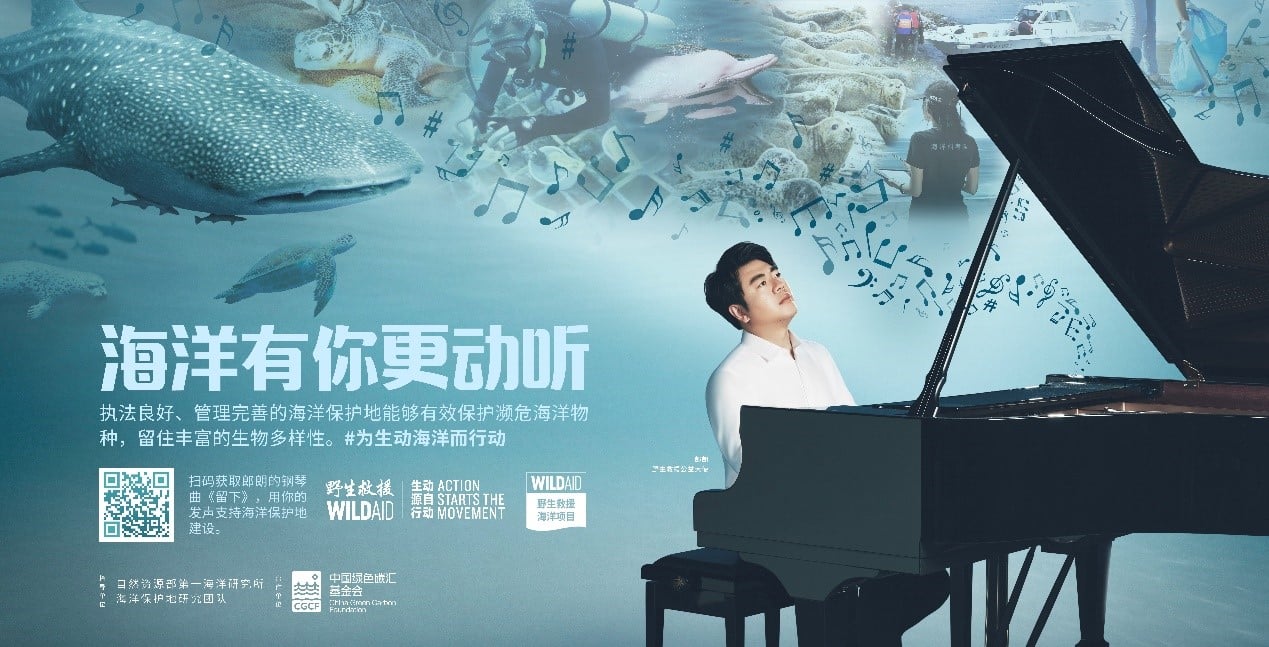One year after WildAid launched its new program to protect ocean wildlife in China, world-renowned pianist Lang Lang has joined the latest public campaign, “Play Your Part in the Ocean’s Symphony.” The campaign video features Lang Lang playing his song “Stay”, dramatically highlighting the beauty and importance of conserving the marine life in China’s waters such as whale sharks, sea turtles, dolphins, and spotted seals.
A new series of messages calls on the public to help protect marine biodiversity by supporting marine protected areas (MPAs) and the conservation of iconic ocean wildlife. The campaign video and billboards, which will be displayed across China, were released at a Beijing press event hosted by WildAid, with China Green Carbon Foundation and the First Institute of Oceanography of the Ministry of Natural Resources (FIO) as key partners.
Hailed by The New York Times as “the hottest classical music artist on the planet” and ranked among “the world’s 100 most influential people” by Time magazine, Lang Lang has served as WildAid ambassador for more than 12 years, committed to protecting endangered wildlife and nature. Speaking at the event he said, “We can all play our part in protecting our oceans by taking simple steps, such as refusing to consume endangered wildlife such as sea turtles, reporting illegal wildlife trade, and reducing the use of single-use plastics.”
The campaign also invites fans to re-create Lang Lang’s song “Stay” via the two most popular social platforms in China: Weibo and Douyin.
“As harmonies or accompaniments make music more powerful, I invite everyone to play with me to express the idea that the more people care about and participate in marine conservation, the more likely we are to keep our oceans alive,” said Lang Lang.
Lang Lang joins this campaign on the heels of a survey report conducted by WildAid and FIO that discusses public awareness of MPAs and marine biodiversity in China. The report finds that more than 80 percent of the survey respondents believe that MPAs are very important, but their understanding of the functions of MPAs is low. More than half don’t know the term “marine biodiversity” and haven’t received enough information about marine conservation.
China currently has 271 MPAs with a total area of 124,000 square kilometers, accounting for approximately 4.1 percent of the sea under its jurisdiction. From this, a national marine protection network has started to develop, which plays an important role in protecting biodiversity and marine resources. However, compared to terrestrial protected areas, China’s MPAs still have room for improvement in terms of quantity, protection level and scope, management capabilities, social attention, and influence.
MPAs are critical to achieving the goal of protecting at least 30 percent of the world’s land and oceans by 2030 in the Kunming-Montreal Global Biodiversity Framework. “MPAs not only contribute to achieving these ambitious and beneficial goals for all humanity but also serve multiple ecological functions, such as carbon sequestration, water purification, climate change mitigation, recreational activities, and resource provision. However, due to the level of scientific understanding from all stakeholders, along with technological capabilities, management methods, and variation in environmental conditions, the protection of the oceans faces greater challenges and difficulties. It requires more investment in advanced technologies, higher levels of awareness, and broad participation and support from all sectors of society,” said Zhang Zhaohui, a researcher at FIO.
WildAid has 20 years of on-the-ground experience in successfully improving the enforcement and management capacity for 95 MPAs in 14 countries around the world. “Our program has effectively reduced the illegal and unsustainable fishing and poaching in those areas. We are also committed to promoting the construction and management of MPAs in China while raising public awareness of marine biodiversity conservation. We believe that with increased public awareness, MPAs will better fulfill their role in protecting marine biodiversity,” said John Baker, the chief program officer of WildAid.
“Play Your Part in the Ocean’s Symphony” campaign video and billboards will be distributed at outdoor locations across China, reaching millions of viewers.




